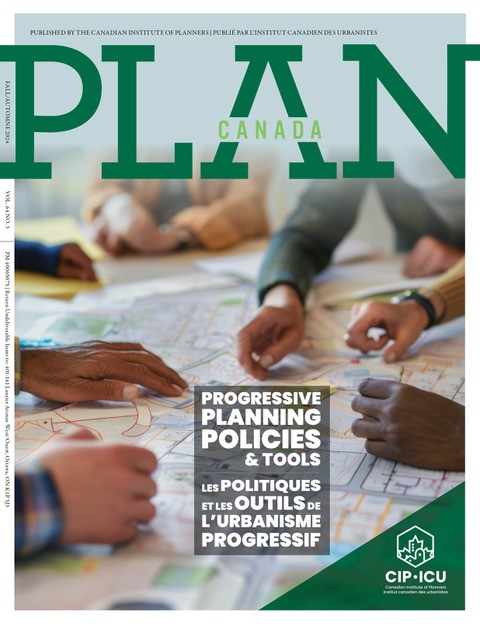Fall 2024, VOL. 64, NO. 3
Planners are called upon to shape the futures of our communities. To get the job done, planners rely on an assortment of tools, including policies, bylaws, standards, and guidelines. These documents put the “plan” in “planning”. Nevertheless, the “what” and the “how” of planning are in constant evolution.
The Fall 2024 issue of Plan Canada is intended to share, illuminate, and discuss progressive planning policies and tools that planners from coast-to-coast-to-coast are using to shape Canada’s communities.
In this issue…
Articles
Shaping Your Community Conversations: Interactive Tools and Collaborative Approaches for Engaging the Public by Samantha Murphy, Michelle L. MacDonald, and Wendy Watts
How to Finance the Restoration of Old Growth Forests through OCP Policies, Residental Density Transfer, and Community Land Stewardship Zoning by Doug Makaroff and Deb Morse
Is Zoning a Barrier to the City We Want? by Trevor Illingworth and Jennifer Renner
Tracking Progress: Using a Community Data Dashboard to Inspire Action in Winnipeg by Barb Besner and Hillary Rosentreter
Reconciliation Planning: Analyzing Municipal Long-Range Planning for Reconciliation in British Columbia by Andreanne Doyon, Anwen Rees, and Moe Nadeau
Design for Equity: A Framework for Addressing Equity in Design Guidelines by Neal LaMontagne
Streamlining the Development Approvals Process with the Adaptable Development Approvals Process Toolkit (ADAPT) by Pam Shaw et al.
Protecting and Enhancing Urban Nature Amid the Housing Crisis by Amelia Needoba, Camille Lefrançois, Zhaohua (Cindy) Cheng, and Cassandra Cummings
Why Every Planning Organization Needs House Rules to Define Terminology and Guide Written Content by Lisa D. Orchard
Columns
Editors’ Note by Ezra Wasser and Rylan Graham
CIP Honours and Awards
Fellows Corner by Anne McIlroy
Planner’s Bookshelf
Book Review
Passings
Planning Research Digest
Contribute Your Expertise
We invite submissions of short papers and research reviews, notes on practice, and book or film reviews. We favour articles with a strong policy framework and context, containing clear methodologies pertaining to studies and research, and providing critical reflection or lessons for planning practice. Submissions on planning-related topics are always welcome, regardless of the theme.
